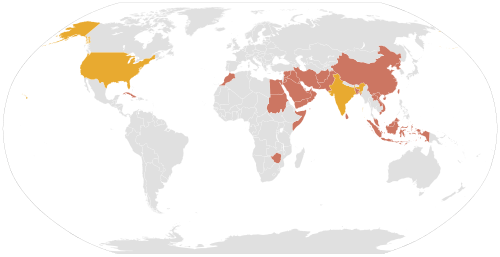Capital punishment for drug trafficking
In certain countries illegal importing, exporting, sale, or possession of drugs constitute capital offences that may result in the death penalty. A March 2018 report by Harm Reduction International[1][2] says: "There are at least 33 countries and territories that prescribe the death penalty for drug offences in law. ... Between January 2015 and December 2017, at least 1,320 people are known to have been executed for drug-related offences - 718 in 2015; 325 in 2016; and 280 in 2017. These estimates do not include China, as reliable figures continue to be unavailable for the country."

A 2015 article by The Economist says 32 countries have the death penalty for drug smuggling, Only in six countries China, Iran, Saudi Arabia, Vietnam, Malaysia and Singapore are drug offenders known to be routinely executed.[3]
According to a 2011 article by the Lawyers Collective, an NGO in India, "32 countries impose capital punishment for offences involving narcotic drugs and psychotropic substances."[4]
A 2009 CNN article lists penalties for drug-related crime in Asia by country.[5] Since then President Thein Sein of Myanmar commuted all of the country’s death sentences to life imprisonment in January 2014.[6] South Korea has the death penalty for drugs.[7] But South Korea has a de facto moratorium on the death penalty since it has not executed anybody since 1997, even though there are still people on death row, and even though new death sentences have been handed down in the last few years.[8]
Use by country
| Country | Notes |
|---|---|
| [9][10][11] | |
| [12] | |
| Option when a second conviction for drug trafficking in quantities specified.[4] | |
| Death penalty for drug-related crimes depending on severity (drug trafficking, possession of large amounts of drugs, etc.) other drug-related crimes may result in life sentencing or other harsh punishments. | |
| Tried under the jurisdiction of the Islamic Revolutionary Court, a special court that tries individuals accused of smuggling, blaspheming or committing acts of treason. Iran ranks second in the world for most executions. | |
| [13][10][11] | |
| [14] | |
| According to the cartography available on the French version of the website of the International Federation of Human Rights, drugs crimes can still be punished by the death penalty in Myanmar in theory.[15] | |
| Saudi Arabia ranks third in the world for the most executions. 43 percent of those executed in 2015 had been convicted of smuggling drugs, ranging from heroin to marijuana.[16] | |
| see Misuse of Drugs Act (Singapore). Muhammad Ridzuan Md Ali is one of the latest drug traffickers executed in Singapore on 19 May 2017 after his appeals were all thrown out.[17] | |
| Drug trafficking can get the death penalty. But South Korea has not had an execution for any offense since 1997.[8][7] | |
| [3][18] | |
| Legal penalty under Narcotics Hazard Prevention Act, though rarely enforced in recent years. Last execution for drug trafficking offense is on 7 October 2002.[19] | |
| Very large quantities or mixtures of heroin, cocaine, ecgonine, phencyclidine (PCP), lysergic acid diethylamide (LSD), marijuana, or methamphetamine. So far, no prisoner has been put on death row for this reason.[20][21][22][23] While the United States Supreme Court in Kennedy v. Louisiana struck down capital punishment for crimes that do not result in the death of a victim, it has left open the possibility for "offenses against the State" – including crimes such as "drug kingpin activity" (and treason and espionage).[24][25] | |
Gallery
 The Singapore embarkation card contains a warning to visitors about the death penalty for drug trafficking under the Misuse of Drugs Act. Warning signs can also be found at the Johor-Singapore Causeway and other border entries.
The Singapore embarkation card contains a warning to visitors about the death penalty for drug trafficking under the Misuse of Drugs Act. Warning signs can also be found at the Johor-Singapore Causeway and other border entries.- A sign at the Taiwan Taoyuan International Airport warns arriving travelers that drug trafficking is a capital offense in Taiwan.
See also
- Capital punishment for cannabis trafficking
- Misuse of Drugs Act (Singapore)
- Capital punishment in Singapore
- Capital punishment in the Republic of China
- Van Tuong Nguyen
- Akmal Shaikh, a British national who was executed in China for drug trafficking in 2009
- Use of capital punishment by country
- Philippine Drug War, and extrajudicial killings.
References
- The Death Penalty for Drug Offences: Global Overview 2017. By Gen Sander. March 2018. Harm Reduction International. See full report.
- Report Reveals World's Most Prolific Executioners for Drug Offences. By Avinash Tharoor. 8 March 2018. TalkingDrugs, site sponsored by Release.
- Which countries have the death penalty for drug smuggling? April 29, 2015. The Economist.
- Bombay High Court overturns mandatory death penalty for drug offences; first in the world to do so Archived 22 May 2013 at the Wayback Machine. 17 June 2011 by Lawyers Collective. "Consequently, the sentencing Court will have the option and not obligation, to impose capital punishment on a person convicted a second time for drugs in quantities specified under Section 31A. ... Across the world, 32 countries impose capital punishment for offenses involving narcotic drugs and psychotropic substances."
- Penalties for drug-related crime in Asia. May 5, 2009. CNN.
- The Death Penalty in Myanmar. Cornell Center on the Death Penalty Worldwide.
- Drug smuggling reaches a record-high in South Korea. Feb. 6, 2015. By Chung Hye-min. The Korea Observer.
- The Death Penalty in South Korea. Cornell Center on the Death Penalty Worldwide.
- "The Death Penalty in Bahrain". Cornell Center on the Death Penalty Worldwide. Retrieved 17 August 2017.
- "10 October 2015 13th World Day against the Death Penalty "The death penalty does not stop drug crimes"" (PDF). World Coalition Against the Death Penalty. Retrieved 17 August 2017.
- "DEATH PENALTY AND DRUG CRIMES - Detailed Factsheet - 13th World Day against the Death Penalty" (PDF). World Coalition Against the Death Penalty. Retrieved 17 August 2017.
- The Death Penalty in the Democratic Republic of the Congo. Cornell Center on the Death Penalty Worldwide.
- "The Death Penalty in Libya". Cornell Center on the Death Penalty Worldwide. Retrieved 17 August 2017.
- Moroccan man gets death for drug trafficking Archived 21 October 2013 at the Wayback Machine. 31 May 2013. New Straits Times.
- "La peine de mort pour les crimes liés à la drogue en Asie".
- Mass Execution Is Part Of Saudi Arabia’s Long History Of Horrors. By Kim Bellware. Jan. 6, 2016. Huffington Post.
- "Singaporean drug trafficker executed at Changi Prison for heroin offence". The Straits Times. 19 May 2017. Retrieved 19 May 2017.
- The Death Penalty in South Sudan. Cornell Center on the Death Penalty Worldwide.
- https://web.archive.org/web/20121017214146/http://www.libertytimes.com.tw/2002/new/oct/9/today-c10.htm
- Schipani, Vanessa; Farley, Robert (5 April 2018). "Q&A: The Death Penalty for Drug Trafficking?". FactCheck.org. Retrieved 15 January 2020.
No administration, Republican or Democrat, has acted on that statutory authority.
- The Federal Death Penalty Act of 1994. Criminal Resource Manual 69. United States Department of Justice - United States Attorneys' Office. "In passing this legislation, Congress established constitutional procedures for imposition of the death penalty for 60 offenses under 13 existing and 28 newly-created Federal capital statutes, which fall into three broad categories: (1) homicide offenses; (2) espionage and treason; and (3) non-homicidal narcotics offenses."
- The death penalty for drug kingpins: Constitutional and international implications. By Eric Pinkard. Fall, 1999. Vermont Law Review. "In 1994 Congress enacted the Federal Death Penalty Act (FDPA) with provisions permitting the imposition of the death penalty on Drug Kingpins. The FDPA is unprecedented in American legal history in that the death penalty can be imposed in cases where the Drug Kingpin does not take a human life." See also: Violent Crime Control and Law Enforcement Act, and the section on the Federal Death Penalty Act.
- 18 USC § 3591 - Sentence of death | Title 18 - Crimes and Criminal Procedure | U.S. Code. Title 18 of the United States Code. Legal Information Institute.
- Syllabus. Kennedy v. Louisiana. Syllabus posted on SCOTUS blog. SCOTUS is Supreme Court of the United States.
- Chapter 4: The Death Penalty for Non-Homicide Drug Trafficking? Kennedy v. Louisiana and the Federal Death Penalty Act Archived 12 October 2013 at the Wayback Machine. By Seth Gurgel. From the book The Contemporary American Struggle with Death Penalty Law: Selected Topics and Cases. U.S.-China Death Penalty Reform Project of the U.S.-Asia Law Institute of NYU School of Law. A paragraph from it that summarizes things (emphasis added):
Making this discussion somewhat easier is the fact that in a recent case totally unrelated to drug trafficking (the case itself addressed the constitutionality of imposing the death penalty for rape of a child where no death occurs), Kennedy v. Louisiana, the U.S. Supreme Court conducted a detailed analysis of the distinction between crimes that do and do not take a human life and the relationship of each type of crime to the death penalty. Within this analysis, in a non-binding portion of the Court’s opinion (dictum), the Court drew an analytical line separating “offenses against the individual” from “offenses against the State.” In its holding, the Kennedy Court stated that, at least within the category of “offenses against the individual,” the death penalty is unconstitutional for crimes that do not take a human life, because the punishment of death is “excessive” and “disproportionate” to the crime, pursuant to the Eighth Amendment’s prohibition on “cruel and unusual punishment.” With respect to the other category, however – “offenses against the State” – including crimes such as drug trafficking (and treason and espionage), even when they do not result in a death, the Court left open the possibility that the death penalty might not be unconstitutionally “excessive” punishment.
External links
Methods of execution:
- Methods of Execution. Death Penalty Worldwide project.
- Methods of Execution by Country - NutzWorld.com
Resources for references:
- Death Penalty | StoptheDrugWar.org. Ongoing compilation of articles about countries sentencing people to death for drug offenses.